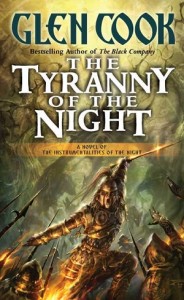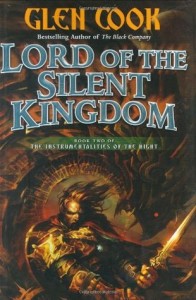 I’ve been an admirer of Glen Cook’s writing for many years, ever since I read Shadowline, the first book of the Starfishers series, way back when. I had never run into anyone who had quite that mix of myth and space opera, with the possible exception of Roger Zelazny, and Zelazny was not doing quite the same thing. Cook’s book seemed somehow more integrated, the archetypes taking on the role of characters without actually being the mythological personalities, if that makes any sense. And his view was much more dark-edged and acidic.
I’ve been an admirer of Glen Cook’s writing for many years, ever since I read Shadowline, the first book of the Starfishers series, way back when. I had never run into anyone who had quite that mix of myth and space opera, with the possible exception of Roger Zelazny, and Zelazny was not doing quite the same thing. Cook’s book seemed somehow more integrated, the archetypes taking on the role of characters without actually being the mythological personalities, if that makes any sense. And his view was much more dark-edged and acidic.
I’ve since been through the Dread Empire, the Black Company, a few stand-alones (Passage at Arms stands out among those), and am now looking forward to catching up on The Garrett Files. So imagine my anticipation when presented with the opportunity to sneak preview the first two volumes of Cook’s newest series, The Instrumentalities of the Night.
Cook starts with the world of Europe and the Middle East in the twelfth century C.E., with some small but critical differences. The Mediterranean is still there, but is separated from and about a hundred feet lower than the Atlantic. The world is fighting off an ice age, of which some people are vaguely aware and most are oblivious. The ice is kept at bay by the magic flowing into the world through wells that are mostly concentrated in the Holy Lands; that flow is slowing. There is a schism in the Church (in this case, the Chaldarean Episcopal Church, with its capital at Brothe, the capital of the ancient Brothen Empire); the Usurper Patriarch sits at Brothe, while the Pretender has his seat at the city of Viscesment under the protection of the Grail Emperor, Johannes Ege, called Hansel Blackboots. Hansel has a deep and abiding dislike for the Brothen Patriarch, Worthy VI, who is, by common consent, a lunatic whose primary tactic in advancing his agenda — whatever that is — is to preach Crusade, against anyone who seems likely.
Into this mix drops Else Tage, a Sha-Lug warrior slave from the Praman kingdom of Dreanger, sent to spy on the Chaldareans and sow whatever mischief he can. In the course of these first two volumes of the series, he succeeds almost too well. Under the name of Piper Hecht, a mercenary who, like most, is reticent about his past, he rises to Captain-General of the Patriarchal army, creating the first effective fighting force the Chaldareans have fielded for centuries. The ultimate target of Worthy’s efforts, is, of course, the Praman South.
 The madness of the gods informs the inrrationality of human beings; it seems that Else maintains some distance, so that we are as surprised as he when he realizes that he is becoming Piper Hecht and has almost forgotten Else Tage. He in danger of forgetting his purpose, caught up in the necessities of the moment in achieving that purpose — like most of Cook’s characters, he is as much a pawn of events as he is in control of his own action. And, in keeping with Cook’s work in general, he can’t trust anyone. And, as might be inferred from the foregoing, Fate, operating as usual as blind chance, takes an active role in affairs.
The madness of the gods informs the inrrationality of human beings; it seems that Else maintains some distance, so that we are as surprised as he when he realizes that he is becoming Piper Hecht and has almost forgotten Else Tage. He in danger of forgetting his purpose, caught up in the necessities of the moment in achieving that purpose — like most of Cook’s characters, he is as much a pawn of events as he is in control of his own action. And, in keeping with Cook’s work in general, he can’t trust anyone. And, as might be inferred from the foregoing, Fate, operating as usual as blind chance, takes an active role in affairs.
This is classic Glen Cook as his fiction has developed over the past thirty years: societies at the breaking point, madness taking the place of civilized behavior, strong personalities following their own agendas, and morality accommodating itself to perceived necessity. Cook has a merciless eye for our rationalizations and self-justifications, the multitudes of ways we find to avoid confronting ourselves. Nor does he limit his scrutiny to our individual failings: neither institutions, movements, nor entire societies are exempt. In the past, Cook has included religious institutions, as creations of frail mortals, in his jaundiced view; in Instrumentalities, the gods themselves are portrayed as brutal, blind, and just as venal and stupid as the worst of their followers.
Cook characterizes his viewpoint as “creeping realism.” I tend to think of it more along the lines of “mordantly world weary.” On this score, Instrumentalities differs more in degree than in kind from earlier works. The satire is more pointed, more savage, and naivete takes as much a beating as corruption.
Sounds grim, doesn’t it?
The idea of literary quality in fantasy and science fiction is still a hard one for many people to accept, even in the face of a line of extraordinary writers. Aside from those whose artistry has been self-aware and immediately apparent — Ballard, Zelazny, Delany, Wolfe, Lindskold, to name a few off the top of my head — there are writers who simply turn out excellent books with a degree of artistry that, while transparent, is noteworthy — Sturgeon, Pohl, Brunner, Silverberg, Brust. Add Cook to that list. I can go back and look at Cook’s work and see the themes being developed, can see the tools being refined, can see ideas and personalities being tried out, realize that it’s all been developing, and still be awed at this one to the extent that I need to go back and look at some earlier works with a new eye. Here, there are no misses, there are no seams. Everything, from the broken-gaited style that reflects the brokenness of the times, the absolutely true-to-life dialogue, the relentless march of events and the complete powerlessness of the characters to affect anything, layers and layers of circumstance and motivation, all come together in an impressive new series by an extraordinarily accomplished writer.
(Tor, 2005 and 2007)
